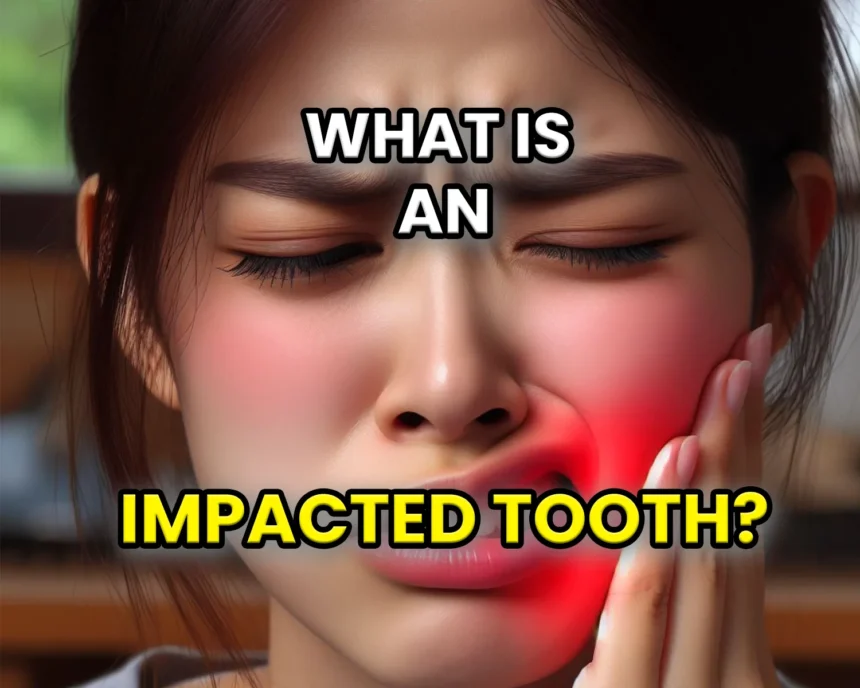An impacted tooth, a common dental concern, occurs when a tooth fails to fully emerge through the gum line or encounters obstruction within the jaw. This dental anomaly, often causing discomfort and potential oral health issues, requires immediate attention to prevent complications. In our exploration of impacted teeth, we’ll uncover the causes, symptoms, and effective relief methods. Moreover, we’ll delve into essential details about what is an impacted tooth and what to do for pain of wisdom tooth, providing comprehensive insights into managing these dental challenges. Here are other important details!
Causes Behind an Impacted Tooth
Numerous factors contribute to teeth becoming impacted. Primarily, insufficient jaw space for natural tooth growth triggers this issue. Overcrowding or irregular alignment of teeth often leads to this limitation. Genetic influences, where jaw size doesn’t align with the number of teeth, also play a significant role. Additionally, abnormal tooth positioning during development can predispose it to impaction.

Symptoms of an Impacted Tooth
There may be no symptoms of a fully impacted tooth. Symptoms of a partially impacted tooth may include;
- Bad breath
- Difficulty opening the mouth (occasionally)
- Pain or tenderness of the gums or jaw bone
- Prolonged headache or jaw ache
- Redness and swelling of the gums around the impacted tooth
- Swollen lymph nodes of the neck (occasionally)
- Unpleasant taste when biting down on or near the area
- Visible gap where a tooth did not emerge
Notably, experiencing these symptoms, particularly if related to concerns about what to do for pain of wisdom tooth, can signal a potential impacted tooth. Seeking evaluation and treatment from a dental professional is advisable in such cases.
What are the Types of Impacted Teeth?
The most prevalent impacted teeth are the third molars, commonly known as wisdom teeth. Typically emerging during late adolescence or early adulthood, they might remain partially or fully impacted due to space constraints. Additionally, wisdom teeth may disrupt dental alignment and structure by contacting adjacent teeth. While wisdom teeth are frequent, canines or premolars may also become impacted, though less frequently.
Read More: All on 6 Dental Implants All You Need To Know About
Alleviating Wisdom Tooth Pain: Effective Home Remedies

When dealing with the discomfort of a wisdom tooth and considering what to do for pain of wisdom tooth, several at-home remedies can offer relief before seeking professional care;
- Saltwater Rinse: A saltwater rinse can be a soothing remedy. Mix a teaspoon of salt in warm water and rinse your mouth gently. This solution helps reduce inflammation and cleanses the area around the impacted tooth.
- Over-the-Counter Pain Relievers: Non-prescription drugs such as ibuprofen or acetaminophen can offer temporary respite from discomfort and inflammation. It’s vital to strictly follow the recommended dosage to avoid adverse effects. Ensure to check the active ingredients as allergies may lead to additional health concerns.
- Clove Oil: Clove oil has natural numbing properties. Applying a small amount to the affected area with a cotton ball can help alleviate discomfort.
- Cold Compress: Applying a cold compress to the outside of the cheek near the affected area can help reduce swelling and ease pain.
- Soft Diet and Proper Oral Hygiene: Avoiding hard, crunchy, or sticky foods can prevent further irritation. Maintaining good oral hygiene by gently brushing and flossing around the affected area can help alleviate discomfort.
Seeking Essential Treatment
Addressing impacted teeth involves a comprehensive assessment by a dental professional. X-rays help evaluate impaction extent and its impact on surrounding teeth. Treatment approaches vary based on impaction severity and the affected tooth’s position.
Mildly impacted teeth might require close monitoring and regular check-ups. Also, severe cases may necessitate surgical intervention, with extraction often recommended for impacted wisdom teeth causing discomfort or posing risks to adjacent teeth and gums. Orthodontic treatments may aid in creating space for natural emergence.
While these remedies may offer temporary relief, it’s important to note that they do not address the underlying cause. Seeking assistance from a near dental clinic would be the best choice.
Read More: What is the Treatment Options for Decay and Infection in Teeth?
Preventive Measures to Mitigate Risks
Though not entirely preventable, certain measures can lower the risk of impacted teeth. Regular dental visits aid in early issue detection. Monitoring tooth growth, especially during adolescence, helps identify potential impaction. Orthodontic solutions, like braces, can properly align teeth, reducing impaction likelihood.
Conclusion: Empowering Oral Health Understanding
Understanding impacted teeth is pivotal for maintaining exceptional oral health. Recognizing causes, symptoms, and available treatment options empowers individuals to seek timely intervention. Also, additionally, at the beginning of the disease or when impaction is suspected, you can consult a our dental clinic and get detailed information.
What is an Impacted Tooth? About FAQ
An untreated impacted tooth can lead to severe complications, potentially becoming life-threatening. Seeking prompt dental evaluation upon experiencing symptoms is crucial to avoid risks.
While impaction can’t always be prevented, orthodontic procedures or oral surgery help remove impacted teeth, like wisdom teeth, or reposition them, such as canine teeth. Dental X-rays assist in determining the best treatment.
Asymptomatic impacted wisdom teeth may not require removal initially. However, if symptoms arise, extraction can minimize risks and significantly improve overall oral health.
Impacted teeth are challenging to clean, trapping food and bacteria, leading to chronic bad breath, decay, and cavities. Neglecting removal can escalate these dental issues.
Wisdom tooth impaction can result in cyst formation, causing pain and damage to the tooth and jawbone. Additionally, the location and lack of space around wisdom teeth increase the risk of gum disease due to inadequate cleaning.


